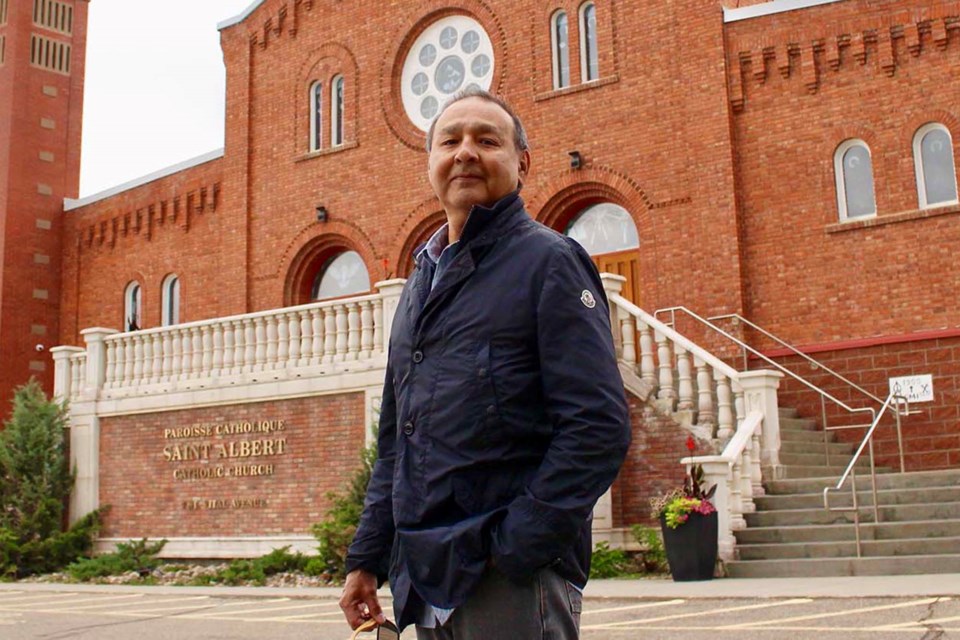A report finding there are no unmarked graves on a site where the Greater St. Albert Catholic School District wants to pave a parking lot is good news to members of the Métis community.
Last week, the school district released a report finding there are no unmarked graves in the area of Mission Hill after Director of the Institute of Prairie Archaeology Dr. Kisha Supernant, and a team of PhD and undergraduate students, used ground-penetrating radar to scan the land in a ground-truthing process.
The land is near the former St. Albert Youville residential school where the majority of attendees were Métis children. The school board is using the land to extend the parking lot near the St. Gabriel Education Centre.
Youville was one of two residential schools in St. Albert, along with the Edmonton Poundmaker school, which is located adjacent to Riverlot 56.
Métis local 1904 president Bruce Gladue said it was an ideal outcome.
“The fact that the superintendent reached out to us in light of the Kamloops situation and just wanted to err on the side of caution, that was huge,” Gladue said.
Gladue said the process was a success because they weren’t able to locate any anomalies that would lead them to believe there were unmarked graves in the area they were searching. Elders and knowledge holders felt it was highly unlikely that unmarked graves would have been found in the area where the parking lot was to be put up.
The Métis community plans to search four other sites in the city in the future, and Gladue said it would be a “perfect scenario” if no unmarked graves were found in each of the different areas.
The school board reaching out to the Métis community was important for Gladue. He said it went a long way toward relationship building and reconciliation.
“I think it's going to provide us a lot of opportunities in the future for collaboration and different ways to work together,” Gladue said.
“Now we're going to have future conversations and it might not just not be about sites like this, it might be about education itself and the curriculum that they’re teaching in the Catholic school system, and maybe now we've got a hands-on opportunity to get the stories from the Métis mouths,” Gladue said.
The school board said in a release they are also happy for the partnership with the Métis community.
“Our division remains grateful for the partnerships formed throughout this process and the deeper understanding of the significance of the work being conducted by Indigenous groups across the country,” said superintendent Clint Moroziuk in a statement.
The area scanned by Supernant, using unique technology known as ground-penetrating radar, is not a residential school site. The superintendent said in the release they wanted to do their due diligence when it comes to all historic sites.
The study, released last week, concluded there is “no reason to suspect the area of the proposed parking lot poses any risk of unmarked graves.”
The site is one of five locations in the city that the Métis community will be involved in ground-truthing.
In the future the Métis community will support the City of St. Albert in searching the White Spruce Park area near Big Lake to ensure there are no unmarked graves in the area from the Youville school before road construction goes ahead. The Métis community will also be searching the Youville school site for unmarked graves.
Riverlot 56 will also undergo ground-truthing, with the possibility of finding unmarked graves on that site.
Gladue said the community has been looking into ground-truthing in these areas for a while, before the recent waves of unmarked graves were discovered at a former residential school site in Kamloops, B.C. Gladue said more layers have been added to the process as it has continued.
Gladue and the Métis community will be connecting with Indigenous leaders from communities surrounding St. Albert, including Alexander First Nation, Paul First Nation, Alexis Nakota Sioux Nation, and the Enoch Cree Nation, to take part in a ceremony marking the beginning of the ground-truthing process.
Gladue will also reach out to three other bands who have been disenfranchised, including the Michel Band near St. Albert.
Gladue said the process of searching for lost children is heavy but having the community recognize the history of the Métis and Indigenous people is a positive.
The community is concerned with the mental health of the survivors and descendants of those who attended the school and wants to ensure that everyone taking part in the process has the mental-health supports they need.




